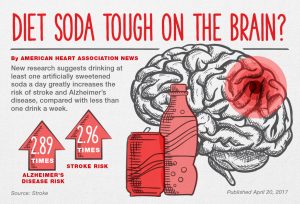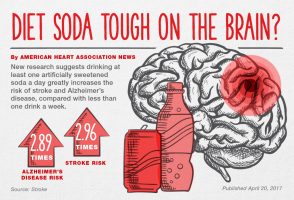Wow! If this headline from the London Evening Standard is correct, we’re in a lot of trouble. For years, so-called experts have been advocating the replacement of sugar with substitutes. And as many people are concerned about the high-fructose corn syrup used in regular sodas, they have made the switch to the “healthier option.”
Personally, I don’t touch sodas other than mixed in the occasional adult beverage but it’s not for a health reason. They bloat me and I don’t like chugging on sweet stuff. On hearing this breaking research I’m glad my finicky tastebuds have prevented me from sucking down diet pop.
Drinking two or more of any kind of artificially sweetened drinks a day is linked to an increased risk of clot-based strokes, heart attacks and early death in women over 50, according to a new study by the American Heart Association and American Stroke Association.
The risks were highest for women with no history of heart disease or diabetes and women who were obese or African-American.
Previous research has shown a link between diet beverages and stroke, dementia, Type 2 diabetes, obesity and metabolic syndrome, which can lead to heart disease and diabetes.
In a research report entitled: Sugar- and Artificially Sweetened Beverages and the Risks of Incident Stroke and Dementia – A Prospective Cohort Study,(research) published in the science journal Stroke, they examined consumption of beverages sweetened with sugar and artificial sweeteners but did not find that same association with sugary beverages.
The results, however, come with a host of caution flags raised by experts. They say the study does not even hint that regular sugary drinks are better for you, or even that artificially sweetened drinks were associated with higher risk of strokes or dementia.
The study’s lead author said the observational study shows an association or trend in a group of people and not a direct cause-and-effect link. It’s more “hypothesis-generating.”
“The jury is still out, and this just shows people need to be cautious,” said Matthew Pase, Ph.D., a fellow in the department of neurology at Boston University School of Medicine and an investigator at the Framingham Heart Study.
Previous studies have looked at artificial sweeteners’ impact on stroke risk. Pase believes this is the first study to look at its association with risk of dementia – and he hopes the work will spur more research into the effects of these sweeteners on the brain.
Researchers analyzed the self-reported diets of two sets of people participating in the Framingham Heart Study, the longest-running heart study in the U.S., funded by the National Heart, Lung, and Blood Institute and run in partnership with Boston University. The study examined beverage intake of 2,888 people over the age of 45 for its stroke analysis and 1,484 people over the age of 60 for the study’s dementia analyses.
Over seven years, researchers used food frequency questionnaires up to three different points in time. They then followed up for the next 10 years to determine who developed stroke and dementia.
At the end of the follow-up period, researchers counted 97 strokes, or 3 percent of the participants in the stroke analysis arm of the study. Of those, 82 were ischemic. The study found 81 cases of dementia, or 5 percent of the participants in the dementia arm of the study. Of those, 63 were diagnosed as Alzheimer’s disease.
The study found that people who reported drinking at least one artificially sweetened drink a day compared with less than one a week were 2.96 times as likely to have an ischemic stroke, caused by blood vessel blockage, and 2.89 times as likely to be diagnosed with dementia due to Alzheimer’s disease. The results were adjusted for variables such as age, sex, caloric intake, diet quality, physical activity and smoking.
Pase and other researchers say the work points clearly to the need to investigate the possible biological reasons artificial sweeteners might affect the brain and the need for more experimental and clinical trials.
“We need to be cautious in the interpretation of these results,” said Rachel K. Johnson, Ph.D., past chair of the American Heart Association’s Nutrition Committee and professor of nutrition at the University of Vermont. “It doesn’t prove cause and effect. When you see these kinds of associations, you want to always ask what is the biological plausibility, what is the mechanism that might be causing this?”
But, Johnson said, there is a part of the issue that is “settled science.”
“We have a robust body of literature on the adverse effects of sugary drinks. Absolutely the message is not to switch to sugary drinks,” she said.
Studies linking added sugars and conditions that lead to cardiovascular disease – the No. 1 cause of death in the world – have been around for years. Diets high in added sugars have been connected to heart risk factors such as obesity and high blood pressure.
In 2012, the AHA and the American Diabetes Association issued a scientific statement on the use of artificial sweeteners, saying “that when used judiciously, [artificial sweeteners] could facilitate reductions in added sugars intake.” The statement called for further research on non-nutritive sweeteners and cardiovascular risk but noted that “limiting added sugars is an important strategy for supporting optimal nutrition and healthy weights.”
Consumers shouldn’t “overinterpret” the latest study’s results, said Christopher Gardner, Ph.D., director of Nutrition Studies at the Stanford Prevention Research Center and a professor of medicine at Stanford University. Gardner was lead author on the 2012 statement.
“It’s a tricky thing,” said Gardner, who leads research into how people can optimize their diets. “Nobody ever said diet sodas were a health food.”
For many people, such as people with diabetes or obesity, he said, diet sodas can be part of the gradual switch from sugary drinks.
“So, the bottom line is, ‘Have more water and have less diet soda,’” he said. “And don’t switch to real soda.”
Pase, who studies how people can change behavior or diet to prevent dementia, said people need to be skeptical when deciding whether to select something with artificial sweeteners or real sugar.
“Just because a beverage is advertised as being healthy because it doesn’t have any sugar doesn’t mean that it is healthy,” Pase said. “Artificial sweeteners may have effects in the body that we haven’t begun to explore.” says The American Heart Association

Abstract
Background and Purpose—Sugar- and artificially-sweetened beverage intake have been linked to cardiometabolic risk factors, which increase the risk of cerebrovascular disease and dementia. We examined whether sugar- or artificially sweetened beverage consumption was associated with the prospective risks of incident stroke or dementia in the community-based Framingham Heart Study Offspring cohort.
Methods—We studied 2888 participants aged >45 years for incident stroke (mean age 62 [SD, 9] years; 45% men) and 1484 participants aged >60 years for incident dementia (mean age 69 [SD, 6] years; 46% men). Beverage intake was quantified using a food-frequency questionnaire at cohort examinations 5 (1991–1995), 6 (1995–1998), and 7 (1998–2001). We quantified recent consumption at examination 7 and cumulative consumption by averaging across examinations. Surveillance for incident events commenced at examination 7 and continued for 10 years. We observed 97 cases of incident stroke (82 ischemic) and 81 cases of incident dementia (63 consistent with Alzheimer’s disease).
Results—After adjustments for age, sex, education (for analysis of dementia), caloric intake, diet quality, physical activity, and smoking, higher recent and higher cumulative intake of artificially sweetened soft drinks were associated with an increased risk of ischemic stroke, all-cause dementia, and Alzheimer’s disease dementia. When comparing daily cumulative intake to 0 per week (reference), the hazard ratios were 2.96 (95% confidence interval, 1.26–6.97) for ischemic stroke and 2.89 (95% confidence interval, 1.18–7.07) for Alzheimer’s disease. Sugar-sweetened beverages were not associated with stroke or dementia.
Conclusions—Artificially sweetened soft drink consumption was associated with a higher risk of stroke and dementia.
Oh, and I don’t know how scientific this is but it’s a cool experiment! Watch what happens when Coke is poured on a rough approximation of “stomach acid!”
